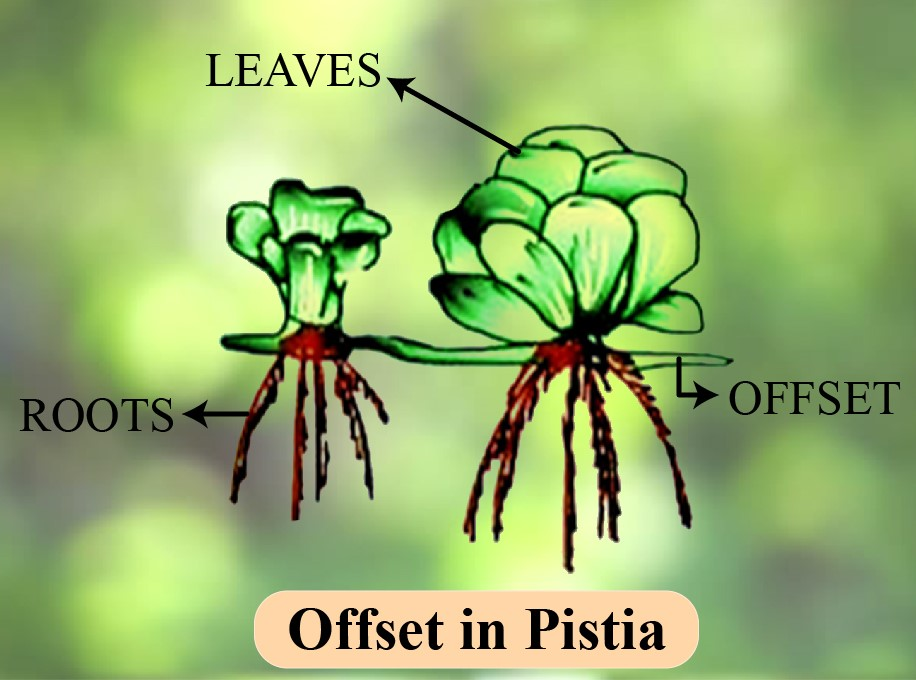
In which of the following is the offset type of a stem predominant
(a) Pistia
(b) Oxalis
(c) Both A and B
(d) None of the above
Answer
590.4k+ views
Hint: An offset is a stout, a runner- like horizontal stem that is a prostate or sub- aerial weak stem. They are the aerial stems that cannot stand upright, without any support. It is predominantly seen in the water cabbage or Nile cabbage.
Complete answer:
Offset is a stout, runner type of a horizontal stem that is found in Pistia. They are weak stems that cannot stand without support. Stems of offset type are soft and can bend without any difficulty. The stem has only one internode and spreads over the ground surface. It is usually found in free- floating hydrophytes like Eichhornia, Pistia, etc. Leaves arise in clusters in the nodal region.
- Offsets in Pistia also helps in vegetative propagation of the organism.
- Vegetative propagation is the process of regeneration of new plants from vegetative parts of the parent plant.
- In Pistia the stem forms offsets that grow parallel to the water surface, forming roots and leaf system at intervals.
- The daughter plants that are formed in this way, remain attached to stolons and have the potential to break away from the parent plant and move away with the water currents.

So, the answer is, “Pistia.”
Note:: Oxalis is an example of a runner type of stem and not offset. Runners are a variation of semi- aerial weak stems too which also spread overground. Runners are produced from the axillary buds and are a means of vegetative propagation. They break off from in between and then form a new individual from it.
Complete answer:
Offset is a stout, runner type of a horizontal stem that is found in Pistia. They are weak stems that cannot stand without support. Stems of offset type are soft and can bend without any difficulty. The stem has only one internode and spreads over the ground surface. It is usually found in free- floating hydrophytes like Eichhornia, Pistia, etc. Leaves arise in clusters in the nodal region.
- Offsets in Pistia also helps in vegetative propagation of the organism.
- Vegetative propagation is the process of regeneration of new plants from vegetative parts of the parent plant.
- In Pistia the stem forms offsets that grow parallel to the water surface, forming roots and leaf system at intervals.
- The daughter plants that are formed in this way, remain attached to stolons and have the potential to break away from the parent plant and move away with the water currents.

So, the answer is, “Pistia.”
Note:: Oxalis is an example of a runner type of stem and not offset. Runners are a variation of semi- aerial weak stems too which also spread overground. Runners are produced from the axillary buds and are a means of vegetative propagation. They break off from in between and then form a new individual from it.
Recently Updated Pages
Master Class 11 Computer Science: Engaging Questions & Answers for Success

Master Class 11 Business Studies: Engaging Questions & Answers for Success

Master Class 11 Economics: Engaging Questions & Answers for Success

Master Class 11 English: Engaging Questions & Answers for Success

Master Class 11 Maths: Engaging Questions & Answers for Success

Master Class 11 Biology: Engaging Questions & Answers for Success

Trending doubts
One Metric ton is equal to kg A 10000 B 1000 C 100 class 11 physics CBSE

There are 720 permutations of the digits 1 2 3 4 5 class 11 maths CBSE

Discuss the various forms of bacteria class 11 biology CBSE

Draw a diagram of a plant cell and label at least eight class 11 biology CBSE

State the laws of reflection of light

Explain zero factorial class 11 maths CBSE




